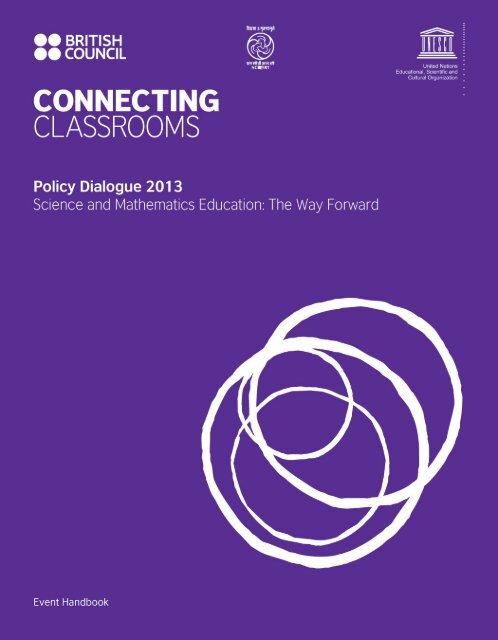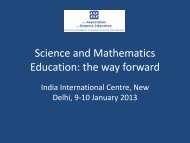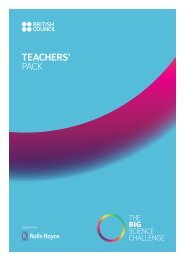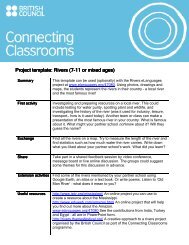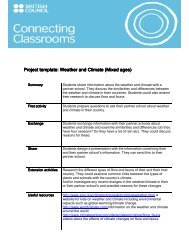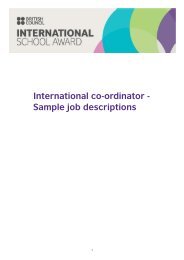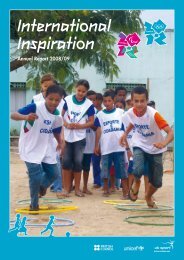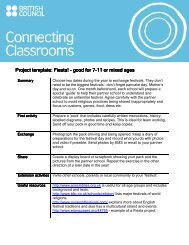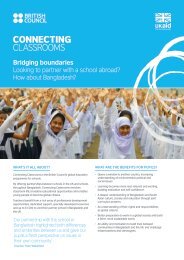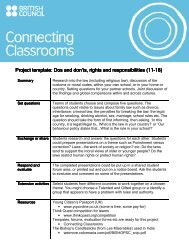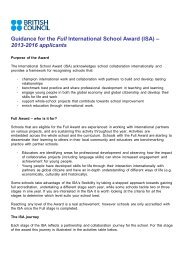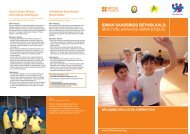Programme - British Council Schools Online
Programme - British Council Schools Online
Programme - British Council Schools Online
You also want an ePaper? Increase the reach of your titles
YUMPU automatically turns print PDFs into web optimized ePapers that Google loves.
POLICY DIALOGUE 9 - 10 January 20131
3and computing are contributing in a big wayto wellness and longevity of life and economicgrowth of nations, and are paving way for newand diverse employment opportunities.Is this expansion being matched sufficientlywith the skills required for maintaining themomentum and accelerating future growth?Are schools fuelling the desire among youngpeople to pursue further education and careerin science and mathematics? Are teachersequipped with the latest knowledge and skillsto make learning of science and mathematicsengaging and inspiring? Are any issues ofaccess and equity impacting teaching andlearning of science and mathematics? Thisevent is an opportunity for policymakers andeducators from across the globe to debatesome of these questions and brainstorm ideasand suggestions for action.There is little doubt that our tomorrow dependson how we educate our young people today,especially in the fields that hold the promise ofproducing future innovations and leading newdiscoveries. I hope you find these two dayseffective in addressing some of the challengesand enjoy learning from the brilliant casestudies and power-packed workshops.Wishing you a very fruitful and engagingprogramme,Sally GogginDirector Education, <strong>British</strong> <strong>Council</strong> IndiaCONTENTAbout the event 4<strong>Programme</strong> 5About the Partners 9Speaker Profiles 13<strong>British</strong> <strong>Council</strong> Offices 29POLICY DIALOGUE 9 - 10 January 2013
4ABOUT THE EVENTSCIENCE AND MATHEMATICS EDUCATION:THE WAY FORWARDThe teaching and learning of Science andMathematics in schools is vital for many ofthe strategic national goals of every country:infrastructure and innovation, economicprosperity, better health, climate, cleanenergy, food security and internationalcompetitiveness – and more. This policydialogue comes at a critical time in educationpolicy and planning as countries aroundthe world focus their attention on theimprovement of Science and Mathematicsteaching and learning. The drive to raise thequality of education in schools and increasethe employability prospects of young people,is throwing a spotlight on best internationalpractice and innovation in these subject areas.However, globally there are big emergingissues around the teaching of Science andMathematics. This policy dialogue will debateand deliberate on following issues andchallenges from national and internationalperspectives through parallel sessions on:OUTCOME• Brief review of the current scenario ineach sector with particular reference tosuccessful practices and innovations• Identification of gap areas in policy andpractice that may be addressed throughfollow-up research and designing of pilotprojects as might emerge from discussion.• Creation of networks and collaborationpartnerships built around common areas ofinterest• Science and Mathematics Education:Widening Scope• Supporting Future Ready Learning ofScience and Mathematics• Motivating and Empowering Young Peopleto succeed in Science and Mathematics
5PROGRAMMEDay 1: 9th January 2013INAUGURAL SESSION0930-1025 hrs Welcome by Rob Lynes, Director <strong>British</strong> <strong>Council</strong>, IndiaIntroductory Address by Sir James Bevan, <strong>British</strong> High CommissionerMr Shigeru Aoyagi, Director and UNESCO RepresentativeDr Parvin Sinclair, Director, National <strong>Council</strong> of Education Research andTraining (NCERT)CONTEXT SETTINGOverview of the science teaching and learning scenario across theworld1025 -1110 hrs Annette Smith, Chief Executive, Association for Science Education, UK1110 - 1130 hrs Tea breakPLENARY 1Perspectives from Industry & Academia – what they need fromScience and Mathematics Education1130 – 1220 hrs Professor Dinesh Singh: Vice Chancellor, University of DelhiSir Keith O’Nions: Rector, Imperial College LondonFacilitator: Sally Goggin, Director - Education, <strong>British</strong> <strong>Council</strong> IndiaPOLICY DIALOGUE 9 - 10 January 2013
6PLENARY 21220 -1345 hrsPerspective on Mathematics and Science Education around theWorldChris Tweedale, Director, Director of <strong>Schools</strong> and Young People Group(SYPG) Wales1345 - 1430 Lunch BreakDr Parvin Sinclair, Director, NCERT, IndiaJohn Duggan, Head, Lampton School, UKMr Xu, Jianguong, Vice Director, The Education Bureau of ChengduQingyang District, ChinaDr Mohammad Kaykobad, Professor CSE Department, BUET, BangladeshDr. Muhannad Beidas, Chief Field Education <strong>Programme</strong>, UNRWA/WestBank, PalestineFacilitator: Susan Douglas, <strong>British</strong> <strong>Council</strong>WORKSHOP 1Theme :Science and Mathematics Education: Widening ScopeTheme Lead: Dr Pravin Sinclair, Director – NCERT,New Delhi1430 – 1530 hrs Case Study 1: Professor Vijaya S Varma, Director, Administration andPlanning, Ambedkar University,Case Study 2: Mr Xu, Jianguong, The Education Bureau of ChengduQingyang District, ChinaCase Study 3: Tom Andrews TES India, Web Science Resources1530-1630 hrs Working Group Leaders: Gouri Srivastava, Susan Douglas, BaldevSinghThere is need to ensure that there is equity and access to scienceeducation of high quality for every child to prepare them to succeedin a knowledge economy. Participants, in three groups are expected toaddress the issue of inequality achievement in science and mathematicsacross gender, marginalized communities and learners with specialeducation needs amongst others in relation to the three outcomes ofthe working groups.1630 – 1700 hrs Feedback from the Group Leaders1900 – 2100 hr Reception Dinner<strong>British</strong> <strong>Council</strong> Division, 17 Kasturba Gandhi Marg, New Delhi
7Day 2 – 10th January 2013WORKSHOP 2Theme: Supporting Future Ready Learning of Science andMathematicsTheme Lead: Dr Tim Slingsby, Advisor Public Engagement in Science,<strong>British</strong> <strong>Council</strong>0900 – 1000 hrs Case Study 1: Unbox 21 - Baldev Singh, Director of Education Strategy,Imagine Education, UKCase Study 2: At-Bristol Museum –Chris O’Callaghan, Formal LearningManager, At-Bristol, UKCase Study 3: Nirmala Sankaran, Co-founder & Managing Director,HeyMath!1000 -1100 hrs Working Group Leaders: Alisher Umarov, Anupam Ahuja, DilipSurkarScience and Mathematics educators are teaching in a time when newknowledge is being created at a speed never witnessed before. The roleof teacher is changing and expectations from the industry and highereducation. The aim of the session is to look at the issues and challengesfacing teachers as they support learning in science and mathematics.The session will explore how teachers may be supported through betterand more relevant online and offline teaching resources, professionaldevelopment opportunities in and pre service, professional networks,managing challenges of cross disciplinary nature of modern science.1100 -1115 hrs Tea Break1115 – 1145 hrs Feedback from the working group leadsPOLICY DIALOGUE 9 - 10 January 2013
8WORKSHOP 3Theme: Motivating and Empowering Young People to succeed inScience and MathematicsTheme Lead: Baldev Singh, Director of Education Strategy, ImagineEducation, UK1200 -1300 hrs Case Study 1: Kabir Shaikh: Director, UNESCO Mahatma Gandhi Instituteof Education for Peace and Sustainable Development (MGIEP)1300- 1345 hrs LunchCase Study 2: Adrian Fenton, Young People's <strong>Programme</strong> Manager,<strong>British</strong> Science Association, LondonCase Study 3: Dilip Surkar, Executive Director, Vikram A SarabhaiCommunity Science Centre1345 - 1445 hrs Working Group Leaders: Annette Smith, Bryan Berry, Sally GogginYoung people across the world have various motives for studying oravoiding science. There are general perceptions that mathematics ishard, girls don’t do well in science, and science requires harder workthan other subjects. In many countries science is preferred subjectbut only because it offers higher employment opportunities. On theother hand there is a drop in the number of students taking science inthe UK. The working group may also explore how to bring science andmathematics in the workplace into the classroom and create a dialoguebetween young people and their potential employers once they leaveschool.1445- 1515 hrs Feedback from working group leads1515-1530 hrs Tea BreakConcluding Session1530 – 1600 hrs Feedback from the 3 Theme Leads1600 – 1615 hrs Summing Up by Alisher Umarov UNESCO Education Specialist1700 – 1715 hrs Vote of thanks by Sally Goggin, Director Education, <strong>British</strong> <strong>Council</strong>Close
9ABOUT THE PARTNERSBRITISH COUNCIL<strong>British</strong> <strong>Council</strong> is UK’s internationalorganisation for educational opportunitiesand cultural relations. It works in over 100countries worldwide to build engagementand trust for the UK through the exchange ofknowledge and ideas between people. <strong>British</strong><strong>Council</strong> was invited by India’s first PrimeMinister Pandit Jawaharlal Nehru to openits first centre in India in 1948. It became adivision of the <strong>British</strong> High Commission in1972. Its headquarters is in New Delhi withoffices in Mumbai, Chennai and Kolkata. The<strong>British</strong> Libraries run in co-operation withthe Indian <strong>Council</strong> for Cultural Relationsin Ahmedabad, Bangalore, Chandigarh,Hyderabad and Pune.<strong>British</strong> <strong>Council</strong>’s three core business areasinclude the Arts, English and Education andSociety. It works in partnership with othergovernment and non-government organisationsin sharing expertise, best practices, facilitatingbetter understanding and cooperation amongstpeople of the world and the UK. It is currentlyworking with state governments for Englishlanguage teacher training and resourcesdevelopment in the states of Punjab, Delhi,Assam, Bihar, Maharashtra, West Bengal andTamil Nadu. <strong>British</strong> <strong>Council</strong> manages the multipartnerUK India Education Research Initiative(UKIERI) and brings many interesting works ofArt to India.POLICY DIALOGUE 9 - 10 January 2013
11NCERTThe National <strong>Council</strong> of Educational Researchand Training (NCERT), established in 1961, isan apex resource organization set up by theGovernment of India. The organisation was setup to assist and advice the Central and StateGovernments on academic matters related toschool education.The major objectives of the NCERT and itsconstituent units are to:1. Undertake, aid, promote and coordinateresearch in areas related to schooleducation;2. Prepare and publish model textbooks,supplementary material, newsletters,journals and other related literature;3. Organize pre-service and in-service trainingof teachers;4. Develop and disseminate innovativeeducational techniques and practices;5. Collaborate and network with stateeducational departments, universities, NGOsand other educational institutions;6. Act as a clearing house for ideas andinformation in matters related to schooleducation; and7. Act as a nodal agency for achieving goals ofuniversalisation of elementary education.In addition to research, development, training,extension, publication and disseminationactivities, the NCERT is an implementationagency for bilateral cultural exchangeprogrammes with other countries in the field ofschool education. The NCERT also interacts andworks in collaboration with the internationalorganizations, visiting foreign delegations andoffers various training facilities to educationalpersonnel from developing countries.UNESCOThe establishment of the United NationsEducational Scientific and Cultural Organisation(UNESCO) dates back to the Second WorldWar when the governments of the Europeancountries met in the United Kingdom for theConference of Allied Ministers of Education(CAME). Upon the proposal of CAME, a UnitedNations Conference for the establishment ofan educational and cultural organization (ECO/CONF) was convened in London from 1 to 16November 1945. At the end of the conference,thirty-seven countries founded UNESCO.UNESCO works to create the conditionsfor dialogue among civilizations, culturesand peoples, based upon respect forcommonly shared values. UNESCO’s uniquecompetencies in education, the sciences,culture and communication and informationcontribute towards the realization of the goals.UNESCO’s mission is to contribute to thebuilding of peace, the eradication of poverty,sustainable development and interculturaldialogue through education, the sciences,culture, communication and information. Theorganization focuses, in particular, on twoglobal priorities—Africa and gender equality;and on a number of overarching objectivesincluding:1. Attaining quality education for all andlifelong learning2. Mobilizing science knowledge and policy forsustainable development3. Addressing emerging social and ethicalchallenges4. Fostering cultural diversity, interculturaldialogue and a culture of peace5. Building inclusive knowledge societiesthrough information and communicationPOLICY DIALOGUE 9 - 10 January 2013
13PROFILE OF SPEAKERSRob LynesDirector <strong>British</strong> <strong>Council</strong>Rob Lynes is theDirector of the <strong>British</strong><strong>Council</strong> in India.Previously Rob wasDeputy Director(Operations) based atthe <strong>British</strong> <strong>Council</strong>’sheadquarters inLondon. Prior to thathe was the RegionalDirector of the Middle East based in Dubai. RobLynes is a trained linguist who studied Russian,Polish and Hungarian and has spent a numberof years in Eastern Europe. During his tenure asRegional Director of the Middle East Rob wasresponsible for strengthening the educationaland cultural links across the region includingthe reopened <strong>British</strong> <strong>Council</strong> centre in Iraq.Sir James Bevan<strong>British</strong> High Commissioner to IndiaThe <strong>British</strong> HighCommissioner to IndiaSir James Bevan KCMGis the representativein India of Her Majestythe Queen. He isresponsible to the<strong>British</strong> Governmentfor all aspects ofthe relationship between UK and India. SirJames studied Social Anthropology at SussexUniversity and joined the Foreign Office in1982. He has served in a number of bilateraland multilateral missions overseas and hasworked on a wide range of political, security,economic, development and other issues. Inhis previous job as the FCO’s Chief OperatingOfficer he led the FCO’s modernisationprogramme and supervised its globaloperations, migration and consular work.Shigeru AoyagiDirector and UNESCO Representative toBhutan, India, Maldives and Sri LankaShigeru Aoyagi joinedUNESCO in July 2002,as Chief of the Literacyand Non-FormalEducation (NFE) sectionwithin the EducationSector at Headquarters.In this capacity, hehas supervised,managed and coordinated the section’s workwithin the framework of EFA, as well as itswork on literacy and NFE for the four regionalprogrammes for universalization of primaryeducation and the eradication of illiteracy. Hehas also contributed to the adoption of theUN resolutions on the United Nations LiteracyDecade (UNLD) International Plan of Action,coordinated the EFA Flagship programmes onUNLD and the UNESCO-FAO joint programme onRural People, and has worked on the launch ofthe Literacy Initiative for Empowerment at theinternational level and in the eleven first-roundimplementation countries.After his assignment in Paris, he wasappointed to Director of the UNESCO Officein Kabul and UNESCO Representative toAfghanistan in December 2006. During histerm in Afghanistan until December 2011he successfully promoted UNESCO’s field ofcompetence, Education, Science, Culture,Communication and Information in Afghanistanin close collaboration with governmentauthorities, UN agencies, and NGOs.In January 2012, he was appointed as Directorof UNESCO Office in New Delhi.SPEAKER PROFILESPOLICY DIALOGUE 9 - 10 January 2013
14Prof. Parvin SinclairDirector-National <strong>Council</strong> of Education,Research and TrainingPresently the Directorof the apex bodyof India for schooleducation, the National<strong>Council</strong> of EducationalResearch and Training(NCERT), Prof Sinclairstarted her careeras a researcher inalgebra at the Tata Institute of FundamentalResearch(TIFR), Mumbai. In 1987 she moved tothe apex body for open and distance learning(ODL) in India, the Indira Gandhi NationalOpen University (IGNOU). It was here thatshe developed her abilities to communicatemathematics through different modes and fordifferent levels, ranging from young childrento doctoral fellows. It was also here that shestarted undertaking research in how childrencan learn mathematics, the way teachingin schools needs to change and in variouscurricular issues. For the last two decades Ihave been focusing on these areas, and tryingto make a difference in the field. Part of thiseffort was to re-design the math syllabi inschools so as to make space for practisingconstructivist approaches to learning. Thiswas in tandem with creating a one-of-its-kindIGNOU programme on how to help childrenlearn mathematics, Certificate <strong>Programme</strong> inTeaching Primary School Mathematics, aimedat primary school teachers and interestedparents, older siblings, etc.Annette Smith,CEO, Association of Science EducationAnnette Smith took up thepost of Chief Executiveat ASE in March 2009.Previously, she served asDirector of Regions withthe <strong>British</strong> Associationfor the Advancement ofScience with responsibilityfor, amongst other things,the Young People's <strong>Programme</strong>, NationalScience and Engineering week, the CRESTawards and the regional team. Her firstdegree was in Physics from the Universityof Liverpool and she subsequently gained aPGCE and a Masters in Science Education.Annette has wide experience of the world ofscience education, with teaching experiencein adult and further education as well as insecondary school science. She has been alecturer in primary science education, an LEAlaboratory technician and worked in industryin environmental health physics and safety.Recently, she held the role of President of theEuropean Science Events Association (EUSCEA)and she is a Fellow of the Institute of Physics.As the Director, NCERT, she is pursuing severalinitiatives undertaken by the faculty and others,for bringing quality education to the last child.This is a major responsibility as based on ourresearch and experience, they provide feed-into policy making of the country. For instance,the curricula designed and defined here formthe academic underpinning of the laws relatedto school education in India.
15Prof Dinesh Singh,Vice Chancellor, Delhi UniversityProf. Dinesh Singh is theVice Chancellor of theUniversity of Delhi sinceOctober 2010. Prior tohis assuming charge asthe Vice Chancellor, heserved as the Directorof the University ofDelhi South Campus.He has also been theHead of the Department of Mathematics ofthe University of Delhi. Apart from his presentdistinguished engagement, Prof. Singh isAdjunct Professor of Mathematics, Universityof Houston, USA since 1999 and is also theDirector of Mathematical Sciences Foundation,Delhi. He serves as a member of severalimportant committees of the Government ofIndia such as the Scientific Advisory Committeeto the Cabinet, on the senate of the Academyof Scientific & Innovative Research, theSteering Committees on Science & Technologyand Higher & Technical Education, PlanningCommission, Government of India as wellas a member of the Board of Governorsof IIT Mumbai and as Chairman, ExecutiveCommittee of National Science Centre, Delhi.He is President Elect (Mathematical Sciences)of the Indian Science Congress Associationin its centenary year and is also a memberof the Governing <strong>Council</strong> of All India Instituteof Medical Sciences, New Delhi. He is on theBoards, Executive <strong>Council</strong>s and Committeesof many universities, professional bodies andinstitutions such as the UGC, Indian ScienceCongress Association, Centre for MathematicalModeling & Computer Simulation, Bangalore,Committee of Central Advisory Board ofEducation (CABE) on University Reforms,National Board of Higher Mathematics etc.Sir Keith O’NionsPresident & Rector, Imperial College LondonSir Keith O’Nions, hasled Imperial CollegeLondon since 1 January2010, after joining theCollege in July 2008to set up and directa new Institute forSecurity Science andTechnology.Sir Keith holds an undergraduate degree ingeology from the University of Nottingham anda PhD in earth sciences from the Universityof Alberta, Canada. After completing hisPhD he took up a Postdoctoral Fellowship atthe University of Oslo before moving to theUniversity of Oxford in 1971 as a Demonstratorand then Lecturer in geochemistry. Hesubsequently became Professor of Geologyat Columbia University in 1975, Royal SocietyResearch Professor at Cambridge in 1979 andHead of Earth Sciences at Oxford in 1995.Sir Keith held the position of Chief ScientificAdvisor to the Ministry of Defence betweenJanuary 2000 and July 2004. He then movedto the Department of Trade and Industry,later known as the Department for Innovation,Universities and Skills, to become DirectorGeneral, Science and Innovation, and ChiefScientific Advisor.SPEAKER PROFILESPOLICY DIALOGUE 9 - 10 January 2013
16Chris Tweedale,Director, <strong>Schools</strong> and YoungPeople, Department for Education and Skills– Welsh Government, UKIn the first part of hiscareer, Chris taught infive secondary schoolsin England including 8years as a secondaryHead in Herefordshire.In 1999, the nationalinspectorate, Ofsted,judged his school tobe in the “most improved” category in thefourth year of his headship. After that he wasappointed as the Senior Education Adviserto UK Ministers and Senior Civil Servants onschool improvement and school workforceissues. During this time was also invited tojoin the Education team at the Prime Minister’sDelivery Unit in the Cabinet Office.Chris joined the Welsh Government four yearsago and has spent this time focussed on raisingachievement and school standards in Wales.PISA and other international benchmarks havesuggested that there is a big job to do and thisyear student outcomes have started to show amarked increase. With the <strong>British</strong> <strong>Council</strong>, Chrishas been involved with Connecting Classroomswork in the UK as well as in Beijing and Taipei.John Duggan,Head Teacher, Lamptom School, UKMr Xu, JianguongVice Director, The Education Bureau ofChengdu Qingyang District, ChinaMr Xu, as ViceDirector, is currentlyresponsible forsecondary education,vocational education,teacher professionaldevelopment, andmathematics & scienceeducational research.He holds a Masters degree in Education fromAustralia. He has been holding various positionswith in the Ministry of Education in China. Hisexperience in education sector with variedresponsibilities is strong in education researchand professional development of teachers.
POLICY DIALOGUE 9 - 10 January 201317
19late 1972, in developing various aspects ofcurriculum development, teacher training andacademic backup of teaching science basedon experimentation, in rural middle schoolsof Madhya Pradesh. She is a member of thegoverning body of the Eklavya Foundation anda Trustee of the Ahvaan Trust.Tom Andrews, General Manager, TES IndiaTom Andrews isGeneral Manager ofTES India. Developedby TSL Education,TES India is the firstdedicated platformfor teachers in India.TES India gives India’s7 million teachersaccess to over 5,00,000 free resources,teaching jobs and a community section wherethey can get advice and inspiration fromcolleagues across the country.As General Manager, Tom is responsible forthe strategy, planning and management of allaspect of TES India. Tom has been with TSLEducation since 2009 and was responsible forestablishing the TSL Information Group, whichprovides business, commercial and competitoranalysis. Prior to TSL Education Tom hasworked in a number of strategic analysisroles in organizations such as McKinsey andCitigroup. TES India was developed by TSLEducation www.tsleducation.com.Dr Baldev Singh, Director of EducationStrategy, Imagine Education Ltd, UKDr Baldev Singhheads the StrategicICT Developments atImagine Education Ltd.He was the head ofICT in large secondaryschool in Bristol (UK)and was the recipient of2004 National TeachingAward for Innovation in Education. Baldev wasinvolved in teacher training (both in the UKand overseas) and completed a ICT teachertraining programme on behalf of the <strong>British</strong><strong>Council</strong> in 6 countries in the Middle East region(NENA project) and more recently in India.He has been engaged in education reform /ICT projects in Singapore, India, Jordan, Egypt,Lebanon, Kenya, South Africa, Namibia, India,Bulgaria, Saudi Arabia, Ukraine, Malaysia, Malta,New Zealand and many schools/educationauthorities in the UK. Baldev also works as aconsultant for the Science Learning Centres inthe UK to develop courses which will developengaged science teaching and learning usingcreative technologies. Baldev has worked asconsultant many commercial organisationssome of which include Channel 4 educationteam, Tesco, Morgan Stanley, Learning skillsnetwork on developing e-learning material foruse in schools. Baldev has also advised <strong>British</strong>Airways on the creation of content for theirlearning centre in London. Baldev also worksas a Microsoft consultant advising on futureschool models in the Middle East region, Europe,Far East and Latin America. He has recentlycompleted work with the MOE in Peru relatedwith the One Laptop per Child Initiative.SPEAKER PROFILESPOLICY DIALOGUE 9 - 10 January 2013
20Chris O'Callaghan, At-Bristol MuseumChris O'Callaghan is aLearning Manager forAt-Bristol, one of theUK’s leading scienceand discovery centreswith a mission to makescience accessible toall. As part of Chris'role here, he leads thedevelopment and operations of the extensiveeducation programme for the 55,000 studentsthat visit the centre every year, to experience“learning outside the classroom”. In additionto supporting the professional developmentof science teachers through our partner,Science Learning Centre South West, Chrisalso manages a range of projects, recentlyincluding science communicator training at theAbu Dhabi science festival and running trainingconferences for UK teachers exploring makingaccessible science for under-representedaudiences.Prior to working in At-Bristol, Chrisdelivered the roll-out and early operations oftwo innovative private tuition centres in the UK.Nirmala Sankaran,Co-founder & Managing Director Hey Math!Nirmala Sankaran is aco-founder of HeyMath!(www.heymath.com) – aninnovative digital Mathprogram developed incollaboration with theUniversity of Cambridge,UK. HeyMath’s missionis to support the workof teachers and inspire students about thetremendous possibilities that Math offers. Overthe last 12 years, HeyMath! has establisheda strong footprint in India, Singapore, Africaand the United States. Nirmala Sankaranleads product development and innovationat HeyMath! She is committed to buildingexcellence in Math education by synthesizingbest practices in teaching from high performingsystems around the world, drawing insightsfrom pedagogical research and staying on topof developments in educational technology.Prior to being an entrepreneur, Nirmala workedfor 12 years with Citigroup in India, MiddleEast, Eastern and Southern Europe and theUS. She has extensive experience in ProductManagement, Product development, Sales andMarketing.Nirmala completed her MBA from IndianInstitute of Management, Bangalore in 1988 andgraduated from Shri Ram College of Commerce,University of Delhi in 1986 (where she stood 1stin University of Delhi). She holds an All India Vposition in the CBSE’s Senior School (Grade 12)leaving Public examination.
21Kabir Shaikh CBE, Director a.i. of the UNESCOMahatma Gandhi Institute of Education forPeace and Sustainable Development (MGIEP)Kabir Shaikh CBE ,Director a.i. of theUNESCO MahatmaGandhi Institute ofEducation for Peaceand SustainableDevelopment (MGIEP).Opened in New Delhiin 2012, this is the firstUNESCO specialized education Institute in Indiaand the first in the Asia-Pacific region.Until 2009, he was the Director of Education forUNRWA/UNESCO which provides education forhalf a million Palestine refugee children basedin Syria, Lebanon, Jordan, Gaza and the WestBank. Until 2002 he was Director of Educationfor Bournemouth Local Education Authority inEngland, which he set up in 1997.He has been on the Association for ScienceEducation’s National Working Party on Sciencefor a Multicultural Society. He has served onseveral national committees and was the Chairof the Partnership Board for Leicester CityEducation. He was a Member of the AdvisoryForum to the Royal Naval School of EducationalTraining and Technology. He also chaired theSteering Group of Local Education Authoritiesfor the provision of Science Services. He is aFellow of the Royal Society of Chemistry andwas awarded an Honorary Doctorate by theOpen University UK. Currently he is a Memberof the Management Board of the <strong>Council</strong> forEducation in the Commonwealth and the HigherEducation Corporation of the Arts UniversityCollege, Bournemouth.He has extensive International Experience andwas the Vice President of CASTME. His workhas involved the Commonwealth Secretariat,UNESCO, Development Education and the<strong>British</strong> <strong>Council</strong>. In 2003 he was awarded a CBEfor services to Education in England.Adrian Fenton,Young People’s <strong>Programme</strong>Manager, <strong>British</strong> Science AssociationAdrian Fenton isthe Young People’s<strong>Programme</strong> Managerat the <strong>British</strong> ScienceAssociation overseeingthe CREST and CRESTStar schemes. Heprevious worked asa teacher with over10 years’ experience in secondary scienceteaching, having worked in Tanzania withVSO on a 2 year placement, and also havingcontributed to the Global Dimension to Sciencedevelopments when previously working atthe ASE. Areas of expertise include specialeducational needs, STEM project work andinclusion in science. The <strong>British</strong> ScienceAssociation is a registered charity thatexists to advance the public understanding,accessibility and accountability of the sciencesand engineering in the UK. Established in1831, the <strong>British</strong> Science Association organisesmajor initiatives across the UK, includingthe annual <strong>British</strong> Science Festival, NationalScience and Engineering Week, programmesof regional and local events, and an extensiveprogramme for young people including itsflagship schemes CREST and CREST Star www.britishscienceassociation.org/crest Over30,000 young people aged 11 to 19 achieved aCREST Award in the last year, which recognisesyoung people’s creative achievements inproject based Science, Technology, Engineeringand Maths (STEM) projects.SPEAKER PROFILESPOLICY DIALOGUE 9 - 10 January 2013
23Dilip V. SurkarExecutive Director,Vikram A SarabhaiCommunity Science Centre, AhmedabadDilip Surkar is currentlyworking as theExecutive Directorof Vikram A SarabhaiCommunity ScienceCentre (VASCSC),Ahmedabad and also asthe Director of VIKSAT,Nehru Foundation forDevelopment, Ahmedabad. The fields of hiswork include environment education, scienceeducation, sustainable development, naturalresource management, rural development,water & sanitation, sustainable livelihoods,rehabilitation, strategic planning, institutiondevelopment & management, etc. VASCSCis coordinating the successful ScienceExpress project across India for the last fiveyears. Under his leadership, VASCSC got theNational Award for Science & TechnologyCommunication from DST, Govt of India in2009, and the Times of India Social ImpactAward for Education in 2011. He is a member ofseveral committees and Governing <strong>Council</strong>s oforganisations working in the field of educationand development.Dr. Alisher Umarov, <strong>Programme</strong> Specialistand Chief of Education Section, UNESCODr. Alisher Umarov,<strong>Programme</strong> Specialistand Chief of EducationSection, UNESCO NewDelhi Cluster Office forBangladesh, Bhutan,India, Nepal, Maldivesand Sri Lanka. Heholds a Master ofScience’s in degree (1984) in MathematicsResearch and Teaching from Tashkent StateUniversity (Uzbekistan), Doctor of Philosophy’sDegree (1992) in Physics and Mathematicsfrom Saint - Petersburg State University(Russia) and UNESCO International Institutefor Educational Planning (Paris, France)Annual Training <strong>Programme</strong>’s Certificate onEducation Administration and Planning (1997).He joined UNESCO in 1997, and worked indifferent capacities in education sector inUNESCO Headquarters in Paris, UNESCOOffices in Tashkent, Bangkok, Almaty, Jakarta,Moscow and New Delhi, and UNESCO CategoryI International Institutes for EducationalPlanning (Paris) and Information Technologiesin Education (Moscow) in close collaborationwith government authorities, donor and UNagencies, and NGOs in Central, South andSouth- East Asia; and Europe. He has also donea number of consultancy works for the AsianDevelopment Bank, and World Bank.SPEAKER PROFILESPOLICY DIALOGUE 9 - 10 January 2013
24Sally Goggin,Director Education, <strong>British</strong> <strong>Council</strong> IndiaSally comes from Artsbackground but sincejoining the <strong>British</strong><strong>Council</strong> over 22 yearsago she has movedprogressively intothe governance andeducation sectors.Sally spent the first 10 years of her <strong>British</strong><strong>Council</strong> career in the UK, latterly as Directorof Operations in the International SeminarsDepartment. She has worked for the past 11years overseas and has been based in thePalestinian Territories, Turkey, and Egypt beforeher current posting to India.In the Palestinian Territories and Turkey Sallyled the <strong>Council</strong>’s governance agenda, and inparticular managed one of the largest humanrights portfolios on behalf of the Foreign andCommonwealth Office.She continued to work on the governanceagenda in Turkey, where as DirectorGovernance she managed a portfolio of workthat directly supported Turkey’s EU Accessionambitions.While working in Egypt as Deputy Director, Sallywas also Director of Education for the Near Eastand North Africa, a remit covering 9 countriesfrom Morocco through to Syria.During her time overseas Sally has alsomanaged large scale donor funded projectsin Education and Governance for World Bank,DFID and the European Commission.Sally took up her current role as Directorof Education India for the <strong>British</strong> <strong>Council</strong>in September 2008. In this role Sally hasresponsibility and oversight of the <strong>British</strong><strong>Council</strong>’s work in every aspect of education.Professor Gouri Srivastava, NCERT, DelhiDr. Gouri Srivastavais Professor & HeadDept. of Women’sStudies NCERT. She hasauthored books andresearch articles onwomen’s education anddevelopment. She is arecipient of scholarshipsfrom National and International organizationson issues concerning women’s education andgender concerns in textual materials.Susan Douglas, <strong>British</strong> <strong>Council</strong>, UKSusan currently sharesher time between the<strong>British</strong> <strong>Council</strong> and theEden Academy.As SeniorAdvisor, <strong>Schools</strong> at the<strong>British</strong> <strong>Council</strong> Susanhas played a pivotalrole in the developmentof ConnectingClassrooms, a global programme linkingeducation ministries and schools in over 70countries worldwide. She has responsibility forleadership programmes in Asia, Latin America,The Middle East and Africa. As CEO of the EdenAcademy Susan was instrumental in founding,and now leads the board of, a multi-academytrust in London which provides 3-19 educationfor children with profound and multiple learningdifficulties.
25Tim Slingsby, <strong>British</strong> <strong>Council</strong> Advisor forPublic Engagement, UKTim has a Ph.D. inmolecular geneticsand continued hiswork at the forefrontof human geneticsresearch with ProfessorSir Alec Jeffreys at theUniversity of Leicester.He has a considerableunderstanding of science communicationand has presented at large internationalmeetings, to political and commercial scientificleaders at the House of Commons and toboth students and the general public. Timis currently the <strong>British</strong> <strong>Council</strong>'s Advisor forPublic Engagement in Science and was mostrecently a senior manager in an organisationthat aims to enrich science learning in schools,making a significant contribution to thesuccess of that organisation in the U.K. He hasinvaluable insight into the medical technology,biotechnology and pharmaceutical industries,being particularly concerned with numerousEU and UK projects that required engagementwith very different sectors of the scientificcommunity. Through work with GreenforceEnvironmental Expeditions, Tim has engagedin the field of biodiversity and wildlifeconservation.Professor Anupam Ahuja, NCERT, IndiaProfessor AnupamAhuja is an internationalconsultant on inclusionand development andreview of educationalprogrammes. Sheworks at the National<strong>Council</strong> of EducationalResearch and Trainingand has over 30 yearsof experience in the field of education witha focus on developing inclusive practices.She is the founder member of the EENETAsia. Anupam has numerous assignments oninitiating, guiding and evaluating inclusiveprogrammes in Africa, Asia and Eastern Europefor UNESCO, UNICEF, World Bank, and a numberof other international organisations. She hascontributed to many international publications on education and school improvement formarginalised groups.Bryan Berry, Centre Director,Science Learning Centre, South West, UKBryan Berry is CentreDirector for the ScienceLearning CentreSouth West and amember of the At-Bristol executive team.Bryan spent ten yearsteaching secondaryscience at John CabotCity Technology College, Bristol, leaving asAssistant Principal with responsibility forcurriculum and assessment. During this timehe taught Science, Physics, Further Mathsand Music Technology. Prior to this, Bryanserved in the Royal Air Force for 12 years asan aircraft engineer. Bryan has a BSc (Hons) inmechanical engineering, a PGCE in Physics, MAEducation Management and an MBA in BusinessManagement. He is a chartered member of theInstitute of Physics and fellow of the RSA.SPEAKER PROFILESPOLICY DIALOGUE 9 - 10 January 2013
26NOTES
27NOTESPOLICY DIALOGUE 9 - 10 January 2013
28NOTES
CONTACT INFORMATIONBRITISH COUNCIL OFFICESNorth India<strong>British</strong> <strong>Council</strong> Division17 Kasturba Gandhi Marg,New Delhi. 110 001t: +91-11-41497120Project Manager | Purti Kohli (purti.kohli@in.britishcouncil.org)West India<strong>British</strong> <strong>Council</strong> Division901. One Indiabulls Centre. Elphinstone Road (West). Mumbai 400013t: +91-22-67486722Project Manager | Chetan Mehta (chetan.mehta@in.britishcouncil.org)East India<strong>British</strong> <strong>Council</strong> DivisionL&T Chambers. I Floor. 16 Camac Street. Kolkata. 700017t: +91-33-40074342Project Manager | Rukmini Ghosh (rukmini.ghosh@in.britishcouncil.org)South India<strong>British</strong> <strong>Council</strong> Division737 Anna Salai. Chennai. 600002t: +91-44-42050629Project Manager | Merlyn Lazarus (merlyn.lazarus@in.britishcouncil.org)


